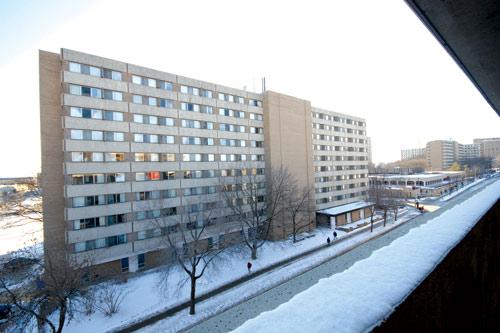Living in a dorm is often perceived as one way to get the true college experience. While the University of Wisconsin does not require its students to live in dorms their freshmen year, 90 percent of incoming freshmen choose to live in UW residence halls.
The reasoning behind this is likely mixed. Students may feel safer in on-campus housing, they may want to live with other freshmen, or they may just like the convenience of not having to search for an apartment when first entering college. There is one thing, however, which students definitely aren’t choosing the dorms for — their cost.
Since 2014, UW has increased room-and-board expenses by about $200 annually. In 2015, expenses were raised by a whopping $1,642, and just last year, the university started requiring mandatory dining plans for incoming freshmen living in the residence halls.
With the addition of the new dining plan, the average cost of UW’s room and board is $11,500. Though UW can boast this cost as one of the lowest in the Big Ten, the reality is that this number is still concerning. For one thing, one must consider that tuition for Wisconsin residents is only $10,555.22.
This means that the cost of some UW dorms have actually surpassed the cost of in-state tuition. There’s a major disconnect in the university’s priorities when it costs more to live on campus than to attend class as an in-state student. While trying to freeze housing costs would be unrealistic, it is obvious that something needs to be done about rising rates for on-campus housing.
Around the U.S., public, four-year colleges have increased their average room and board expenses from $4,812 in 1980 to $9,798 in 2014. Rising tuition costs and increased student debt mean that the majority of students are struggling to pay for college today.
Underprivileged students are already dealing with enough — why throw ridiculously priced housing rates at them on top of everything? If a student cannot afford to live in a dorm on their own campus, then something is terribly wrong.
Living in a college dorm is a right of passage, and every UW student should be able to experience it. Though it’s admirable that UW is trying to improve its quality of dorm life through building renovations like those at Witte, the reality is that these improvements will only increase the cost of living. For the 2019-20 academic year, the cost of a double room in Witte will be increasing from a range of $9,950-10,150 to $10,700-10,900 for new students.
Furthermore, student-led initiatives like the Residential Halls Board only perpetuate the idea that privileged voices are the only ones really heard on UW’s campus. Tiffany Sneed, a recent UW graduate and first-generation college student who sat on her residential hall board, described her experience in a recent Isthmus piece.
“These were very well-off kids complaining about the food and how the food tastes and not the price of the food or the price of the dorms,” Sneed said.
Simply put, UW Housing should be thinking about students like Sneed before deciding to raise their prices again. It seems the majority of the UW student body and administration live in a bubble that allows them to believe everyone can afford their cost of living. But not enough attention is given to the underprivileged, first-generation college students who are just struggling to afford tuition.
Living in a college dorm should not be something students can barely afford, and one’s cost of living should not outweigh their cost of tuition to attend college. Overall, UW needs to reevaluate increasing its room and board expenses, especially considering the financial burdens that many college students are already facing.
Courtney Degen (cdegen@wisc.edu) is a sophomore majoring in political science and journalism.


